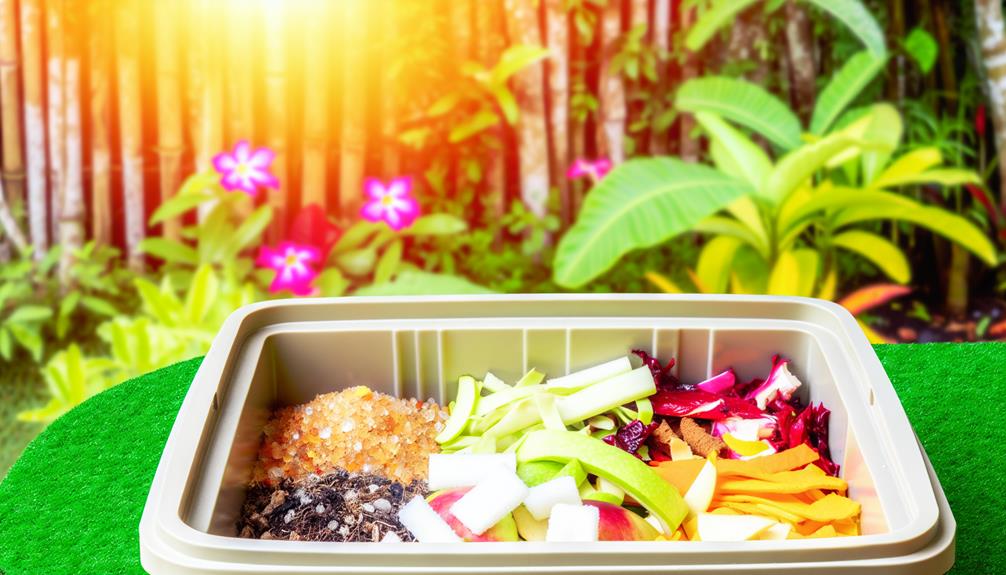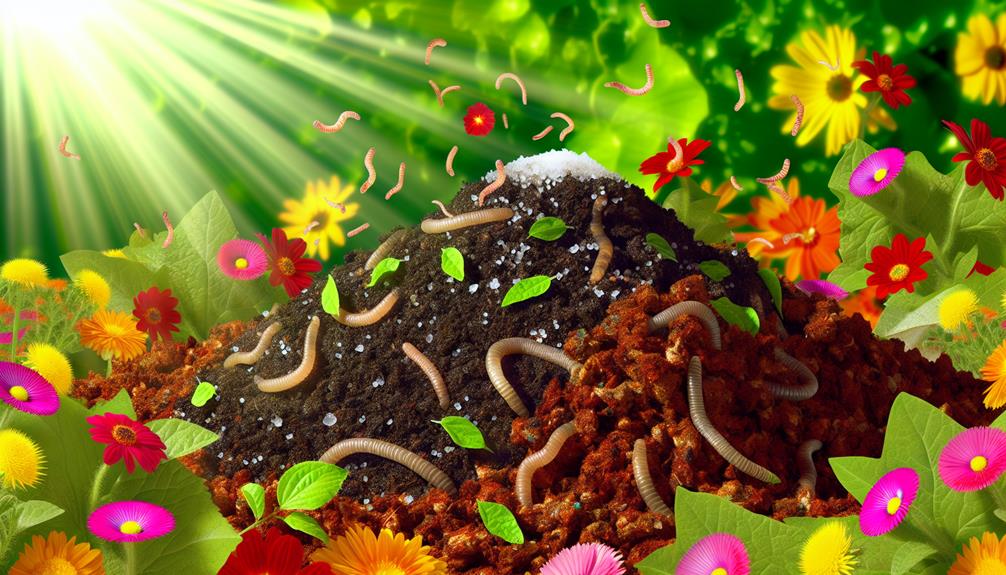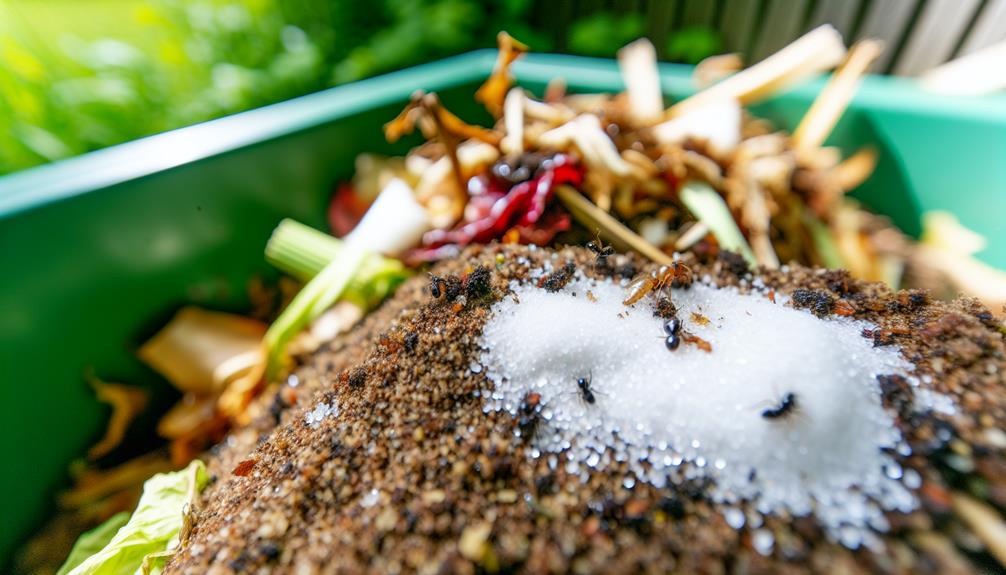

You can compost sugar, and it can actually speed up decomposition. Sugar offers quick energy for microorganisms, helping them break down organic matter more efficiently. Use a balanced mix of sugar waste with other organic materials to avoid issues. Raw and brown sugar are great options because they’re less processed.
Sprinkle small amounts evenly throughout your compost and turn it regularly for best results. Be mindful of attracting pests; covering the pile with soil or brown materials can help. By maintaining a good carbon-to-nitrogen ratio, you’ll enhance your compost’s quality. Keep learning to optimize your composting efforts further.
How does sugar impact the composting process? When you add sugar waste to your compost pile, it can actually speed up decomposition. The sweet residue left behind from sugary foods acts as a quick source of energy for the microorganisms in your compost.
These microorganisms break down organic matter more efficiently when they’ve easy access to sugars, helping your compost pile heat up faster and maintain the necessary temperatures for effective composting.
To compost sugar waste effectively, you’ll want to take a few tips into account. First, balance is key. While sugar can be beneficial, too much of it can attract unwanted pests like ants or flies. Mixing your sugar waste with a variety of organic materials, such as fruit peels, vegetable scraps, and yard clippings, helps maintain a healthy compost mix. This balance ensures that your compost doesn’t become overly acidic or too attractive to pests.
Additionally, make sure to turn your compost regularly. This ensures that the sweet residue and other materials are evenly distributed, promoting consistent decomposition.
To understand how sugar influences composting, it’s helpful to know its chemical composition. Sugar, commonly known as sucrose, consists of carbon, hydrogen, and oxygen atoms. It features a molecular structure where glucose and fructose units connect via a glycosidic bond. This bond and the arrangement of atoms make sugar a simple carbohydrate.
When you look at the molecular structure of sucrose, you’ll see that it has 12 carbon atoms, 22 hydrogen atoms, and 11 oxygen atoms (C12H22O11). These atoms are held together by strong chemical bonds, which are essential for the breakdown process in composting. The chemical bonds in sugar are relatively easy for microorganisms to break down, providing them with a quick energy source.
In your compost pile, these microorganisms will work on breaking these bonds, converting the sugar into simpler compounds. This process is vital for the decomposition and nutrient cycling within your compost.
Understanding this basic chemistry helps you see why sugar can be a beneficial addition to your compost mix. Remember, the molecular structure and chemical bonds of sugar play key roles in how effectively it decomposes and contributes to the overall health of your compost pile.
Also Read: Can You Compost Butter?
Adding sugar to your compost pile can greatly boost microbial activity and accelerate the decomposition process. When you introduce sugar sources like table sugar, fruit scraps, or even sugarcane residue, you’re providing an energy boost for the microbes that break down organic matter. These microbes thrive on sugars, making them work faster and more efficiently.

Despite common compost myths suggesting sugar might attract pests or disrupt the balance, it’s actually quite beneficial when used correctly. The key is to maintain; too much sugar can indeed cause issues, but a balanced approach can yield great results.
You’ll want to mix sugar sources evenly throughout your compost pile. This ensures that the microbes have consistent access to the energy they need.
Additionally, sugar helps in breaking down tougher organic materials like leaves and small branches, making your compost richer and more nutrient-dense.
When you add sugar to your compost, it enhances microbial activity, speeding up decomposition.
The sugar also helps balance the carbon-nitrogen ratio, essential for efficient composting.
Additionally, it attracts beneficial organisms, enhancing the overall compost quality.
Sugar can greatly enhance microbial activity in your compost pile, accelerating the decomposition process. When you add sugar, you’re essentially providing a quick energy source for the microbes. This boost in energy allows microbial enzymes to break down organic matter more efficiently. By doing so, you foster a robust environment where microbial diversity thrives, which is essential for a healthy compost system.
To get started, sprinkle a small amount of sugar evenly across your compost pile. Too much can create imbalances and attract pests, so moderation is key. You’ll notice that this simple addition speeds up the breakdown of materials like leaves, grass clippings, and kitchen scraps. The increased activity of these beneficial microbes results in a richer, more nutrient-dense compost.
Moreover, this method is particularly effective if you’re dealing with slow-decomposing materials. The heightened microbial activity can tackle tougher substances, making your composting efforts more efficient.
By understanding and leveraging the role of sugar in boosting microbial diversity and enzyme activity, you’re not just speeding up decomposition—you’re also creating a more balanced and thriving compost ecosystem.
Balancing the carbon-nitrogen ratio in your compost is crucial, and sugar can play a significant role in this process. Composting is all about maintaining the right mix of carbon-rich and nitrogen-rich materials. Sugar, which is high in carbon, can help balance your compost heap, especially if you’re composting a lot of nitrogen-heavy organic matter like kitchen scraps and grass clippings.
| Material Type | Carbon-Nitrogen Ratio |
|---|---|
| Sugar | High Carbon |
| Kitchen Scraps | High Nitrogen |
| Grass Clippings | High Nitrogen |
When you add sugar to your compost heap, it boosts the carbon content, which in turn helps maintain the ideal carbon to nitrogen ratio of about 30:1. This balance is essential for efficient decomposition and to avoid a smelly compost pile. Remember, too much nitrogen can lead to a slimy mess, so sugar can be a handy tool in your composting kit.
Make sure to mix the sugar well with other organic matter to guarantee even distribution. By doing so, you’re promoting a healthy and efficient composting process, turning your organic waste into valuable, nutrient-rich compost for your garden.
By incorporating sugar into your compost, you’ll attract beneficial organisms that accelerate the decomposition process. Microbes, fungi, and other decomposers thrive on sugar, using it as a key energy source. These organisms break down organic material more efficiently, enriching your compost. The result? Faster composting and a nutrient-rich end product.
These essential organisms play an important role in enhancing soil fertility. As they decompose organic matter, they release necessary nutrients like nitrogen, phosphorus, and potassium. These nutrients are crucial for plant growth and soil health, making your garden flourish.
Moreover, incorporating sugar into your compost can improve water retention. Decomposed organic matter, or humus, helps soil retain moisture more effectively. When your soil holds water better, your plants require less frequent watering, ensuring a more sustainable gardening practice.
To get started, sprinkle a small amount of sugar over your compost pile. Be careful not to overdo it; too much sugar can attract pests like ants or rodents. Aim for a balanced mix of green and brown materials, and turn your pile regularly to aerate it. By following these tips, you’ll create a thriving compost system that boosts soil fertility and water retention.
When composting, you’ll find certain types of sugar more suitable due to their organic nature and ease of decomposition. Raw sugar and brown sugar are excellent choices. These sugars are less processed, retaining more natural molasses and nutrients, which can enhance the compost pile’s microbial activity. This not only speeds up decomposition but also contributes valuable minerals to the finished compost.
Raw sugar, with its larger crystals and light brown hue, breaks down efficiently. It provides a quick energy source for microorganisms, making it a reliable addition to your compost.
Brown sugar, which is basically white sugar with added molasses, offers similar benefits. Its slightly sticky texture helps bind other compost materials, enhancing the overall structure of the pile.
When adding these sugars, moderation is key. Too much can attract pests or create an imbalance. Sprinkle small amounts and mix them evenly into your compost heap. This makes sure that the sugars are distributed and utilized effectively.
To achieve an effective compost pile, focus on creating the right balance between carbon-rich and nitrogen-rich materials. This balance, often referred to as the ‘greens’ and ‘browns’ ratio, is essential for a thriving compost system. Carbon-rich materials, like dry leaves and straw, provide energy for microorganisms, while nitrogen-rich materials, such as grass clippings and kitchen scraps, offer the protein required for growth and reproduction.
When adding sugar or sugar substitutes to your compost, remember that sugar falls into the carbon-rich category. To maintain a proper balance, mix sugar with nitrogen-rich items like vegetable peels or coffee grounds. An ideal ratio to aim for is roughly 30 parts carbon to 1 part nitrogen.
If you’re making compost tea, the balance of carbon and nitrogen is equally important. Compost tea acts as a nutrient-rich liquid fertilizer, and its efficacy depends on the quality of your compost. Including sugar substitutes can enhance the microbial activity, but be mindful of the amounts used. Too much carbon can slow down the decomposition process, leading to less efficient compost.
Also Read: Can You Compost Celery?
When composting sugar, you might face a couple of issues.

First, sugar can attract unwanted pests like ants and rodents.
Additionally, adding too much sugar may lead to imbalanced compost ratios, disrupting the decomposition process.
To guarantee the effectiveness of your compost pile, avoid adding large quantities of sugar or sugary foods that can attract unwanted pests like ants, flies, and rodents. Instead, focus on maintaining a balanced mix of green (nitrogen-rich) and brown (carbon-rich) materials to prevent pest infestation. This will help to mask the sweet smells released during sugar decomposition, keeping your compost pile healthy.
If you observe ants or flies gathering around your compost, it may be time to turn the pile more frequently. Turning the compost assists in aerating it and expediting the decomposition process, reducing the likelihood of attracting pests.
Another method to deter pests is by covering your compost pile with a layer of soil or brown materials like leaves. This acts as a barrier that conceals the sugary scents, making the compost less appealing to unwanted visitors.
Overloading your compost pile with sugar can disrupt the essential balance between green and brown materials, leading to slower decomposition and potential odor issues. When sugar is added in excess, it can create a nutrient overload that influences the microbial activity negatively. This imbalance can cause your compost to become too moist, making moisture control a critical challenge.
To help you manage this, consider the following table:
| Issue | Solution |
|---|---|
| Nutrient overload | Add more brown materials |
| Excessive moisture | Incorporate dry materials |
| Odor problems | Turn the compost frequently |
By adding more brown materials like dried leaves or cardboard, you can counteract the nutrient overload caused by too much sugar. This helps restore the balance between carbon and nitrogen, which is essential for efficient decomposition.
Additionally, incorporating dry materials can help with moisture control. This prevents the compost from becoming too wet, which can lead to mold growth and unpleasant odors. Remember to turn your compost frequently to aerate it, promoting better microbial activity and faster decomposition.
Incorporating sugar into your compost pile can boost the decomposition process, but it’s important to do so in moderation. A common composting myth is that all sugar is bad for compost. The truth is, small amounts can actually help break down organic matter more quickly.
However, you should also consider sugar alternatives like fruits and vegetables, which provide natural sugars and additional nutrients.
When adding sugar, start with a small amount—no more than a quarter cup for a standard compost bin. Sprinkle it evenly over the compost pile to avoid clumping. It’s essential to mix it well with other materials to ensure even distribution and prevent attracting pests.
Balancing your compost’s carbon-to-nitrogen ratio is key. Sugar is a carbon-rich material, so pair it with nitrogen-rich ‘greens’ like grass clippings or kitchen scraps. This balance will keep the composting process efficient.
Also Read: Can You Compost Artichoke?
Many gardeners have found that adding small amounts of sugar to their compost piles accelerates decomposition and enriches the final product. You can see this in various urban gardening and community composting projects where sugar is used effectively.
Yes, sugar can attract pests to your compost pile. For effective pest prevention, use natural repellents like citrus peels or mint. This way, you’ll maintain a welcoming compost environment without unwanted visitors.
Yes, adding sugar to your compost can affect soil acidity and boost microbial activity. You’ll find it enhances the composting process and strengthens your garden community by creating a richer, more fertile soil environment.
Yes, it’s safe to compost sugar in a worm bin. However, you need to monitor worm health. Excess sugar can disrupt their digestion. Start with small amounts and make sure they’re thriving to maintain a balanced ecosystem.
To maintain a healthy compost, you should manage your sugar quantity carefully. Stick to small daily limits, like a teaspoon or two, to avoid disrupting the balance. Your compost community will thrive with proper moderation!
You’re wondering if you can compost sugar substitutes like stevia or aspartame. While stevia, being plant-based, aids organic decomposition, artificial alternative sweeteners like aspartame don’t break down well. Stick to natural options for a thriving compost community.
Incorporating sugar into your compost can boost microbial activity and accelerate decomposition. Stick to natural sugars like brown sugar or molasses, and avoid large quantities to prevent attracting pests.
Balance sugar with nitrogen-rich materials and monitor moisture levels for best results. By following these guidelines, you’ll improve compost quality and efficiency.
Always adjust based on your compost pile’s specific needs, ensuring a healthy balance for effective decomposition. Happy composting!

Don't let aphids, slugs, and caterpillars ruin another plant. Take back control with simple, natural methods that actually work.